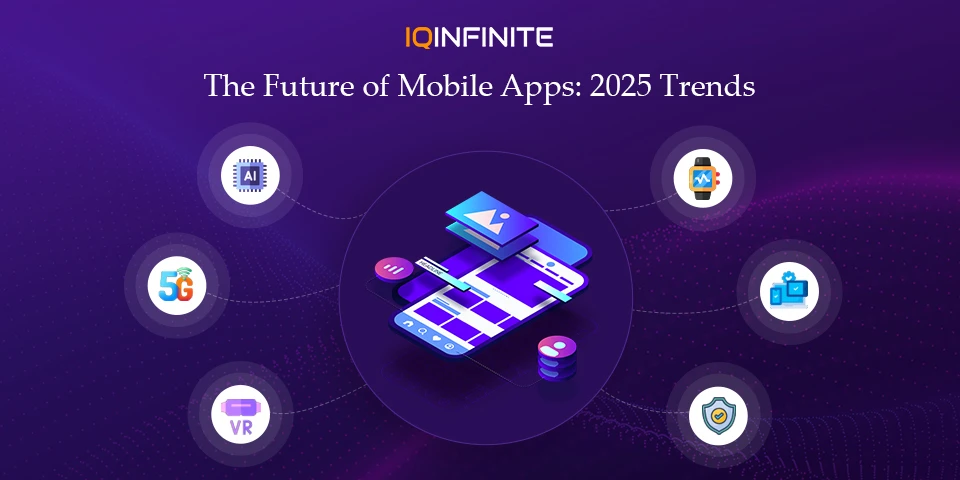Top Mobile App Development Trends in 2025

Mobile apps are no longer just convenient tools they’ve become essential to how we live, work, shop and connect. From streamlining business operations to transforming customer experiences, apps continue to redefine industries and lifestyles alike.
As technology advances at a rapid pace, the mobile app ecosystem is entering an exciting new era. Businesses and developers who stay ahead of emerging trends will not only remain competitive but also unlock new opportunities for growth and innovation.
In 2025, the industry is set to achieve remarkable milestones, fuelled by cutting-edge technologies, intelligent design and ever-evolving user expectations.
Let’s explore the top mobile app development trends that are shaping the future:
Artificial Intelligence (AI) and Machine Learning (ML) are no longer optional they’re essential. Apps that analyse user behaviour and provide personalized experiences are setting the benchmark for customer satisfaction. From smart chatbots to predictive recommendations, AI-powered personalization will continue to dominate app development.
2. 5G and Enhanced Connectivity
The global rollout of 5G is unlocking new possibilities for apps. With ultra-fast speeds and low latency, developers can now create real-time features such as multiplayer gaming, high-quality video streaming, AR navigation and immersive virtual meetings. 5G is more than faster browsing it’s enabling next-gen app experiences.
3. AR, VR and Immersive Experiences
Augmented Reality (AR) and Virtual Reality (VR) are reshaping industries like retail, education, real estate and healthcare. From virtual try-ons to 3D property tours, immersive experiences are becoming mainstream. With devices supporting AR/VR more widely, app developers are investing heavily in spatial and immersive technologies.
4. Cross-Platform and Low-Code Development
Businesses no longer want to build separate apps for iOS and Android. Cross-platform frameworks like Flutter and React Native are making it easier to develop apps that work seamlessly on multiple devices. Additionally, low-code/no-code platforms allow faster development with minimal technical effort helping startups and enterprises save both time and cost.
5. IoT and Wearables Integration
From smartwatches to connected cars and home automation devices, the Internet of Things (IoT) is expanding rapidly. Mobile apps are acting as central control hubs, allowing users to manage multiple devices from a single interface. As IoT adoption grows, seamless app integration with wearables and smart gadgets will become the norm.
6. Rise of Super Apps
Inspired by platforms like WeChat and Grab, super apps combine multiple services messaging, payments, shopping, bookings into a single ecosystem. Instead of juggling multiple apps, users prefer the convenience of all-in-one platforms. This trend is gaining traction in emerging markets and is expected to spread globally.
7. Security and Privacy by Design
Data security and privacy are at the heart of user trust. With stricter regulations (GDPR, CCPA) apps are expected to provide strong encryption, biometric authentication and transparent privacy policies. Developers who prioritize “security by design” will have a significant advantage in attracting and retaining users.
8. Sustainable and Efficient Apps
Eco-conscious users are increasingly favouring apps that consume less data, battery and device resources. Developers are focusing on lightweight, efficient and sustainable app design, which not only benefits the environment but also improves performance and user satisfaction.
Why These Matter
- Better User Engagement & Retention: Users expect tailored, fast and immersive experiences. Apps that can deliver these will retain users better.
- Cost & Time Efficiency: Using cross-platform and low-code tools can shrink development cycles and maintenance costs.
- Competitive Advantage: Being among the first in your space to integrate AR/VR, to use 5G capabilities or to offer a super app experience sets you ahead.
- Trust & Compliance: Strong security and privacy features are not just legal requirements but also key trust signals for users.
Conclusion
Whether it’s AI-powered personalization, AR-driven shopping experiences or 5G-enabled real-time features, the future of mobile apps is bright and full of opportunities.
